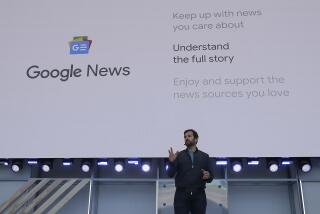Public Broadcasters Pick Up Static on Capitol Hill
WASHINGTON â Public broadcasters asked Capitol Hill for half a billion dollars Wednesday to help it meet a government-mandated transition to digital technology.
But rather than commitments of financial support, organizations such as the Corporation for Public Broadcasting and National Public Radio got an earful from Republican lawmakers about the perceived liberal bias of their programming.
Relations between public broadcasters and the Republican-controlled House have been rocky since the late 1990s, when it was revealed that some public broadcasting stations had shared their subscriber lists with the Democratic National Committee for fund-raising purposes.
Rep. W. J. âBillyâ Tauzin (R-La.), chairman of the House Energy and Commerce Committee, which oversees the Corporation for Public Broadcasting, shelved efforts to reauthorize government funding for public broadcasters. That funding, which accounts for 12% of the CPBâs revenue, is set to expire in 2004.
For five years public broadcasters have unsuccessfully sought funds to help them build new facilities and buy equipment to broadcast digital television and radio signals by the government-imposed deadline of May 2003.
âIâm conflicted,â Tauzin said Wednesday during a hearing intended to address digital conversion, but that turned into a familiar debate about programming on publicly supported TV and radio. âAmerican taxpayers feel that public television is not fair.â
A point of contention was a January report on NPR suggesting that the Traditional Values Coalition, a Christian advocacy group in Orange County, had a motive in the lethal anthrax attacks on U.S. Sens. Tom Daschle (D-S.D.) and Patrick J. Leahy (D-Vt). The coalition recently had criticized both senators for removing the phrase âso help me Godâ from the oath in their committee hearings.
NPR later aired a retraction, calling the story âinappropriate.â
But at the hearing Wednesday, the coalitionâs executive director, Andrea Lafferty, squared off against NPR President and Chief Executive Kevin Klose, calling NPR âanti-Christian.â
Under pressure from several Republican lawmakers, Klose formally apologized for the story. But Lafferty still asked the committee to punish NPR by revoking its federal funding, which accounts for about 2% of NPRâs revenue, according to Klose.
Democrats rushed to the defense of public broadcasters, citing their contributions to quality, top-rated childrenâs programming and news coverage, including after the terrorist attacks.
Rep. Sherrod Brown (D-Ohio) dismissed complaints about liberal bias as âranting and ravingâ by Republicans seeking to intimidate broadcasters into providing more conservative coverage.
The partisan debate was a setback for public broadcasting officials, who had hoped they would be able to move beyond the controversy over their programming and talk about their funding needs.
The Assn. of Public Television Stations estimates it will cost $1.7 billion to convert the nationâs 356 public broadcasting stations to digital. So far, only about 76 stations have made the transition.
The government is pressing public and commercial broadcasters to convert to digital signals, which provide clearer sound and pictures, increased channel capacity for programming and interactive features. The government also is eager to move broadcasters off existing analog channels so they can auction off the spectrum for other purposes.
More to Read
Sign up for Essential California
The most important California stories and recommendations in your inbox every morning.
You may occasionally receive promotional content from the Los Angeles Times.










